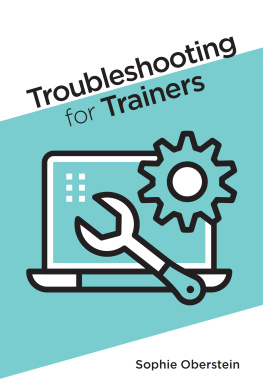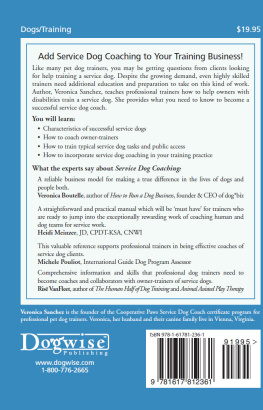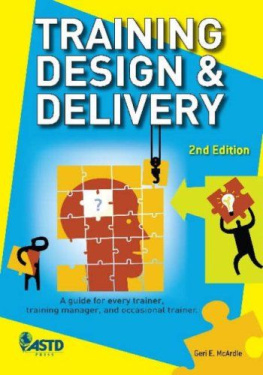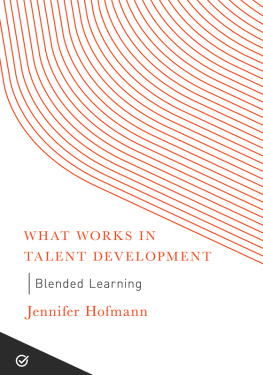

2020 ASTD DBA the Association for Talent Development (ATD)
All rights reserved. Printed in the United States of America.
23 22 21 20 1 2 3 4 5
No part of this publication may be reproduced, distributed, or transmitted in any form or by any means, including photocopying, recording, information storage and retrieval systems, or other electronic or mechanical methods, without the prior written permission of the publisher, except in the case of brief quotations embodied in critical reviews and certain other noncommercial uses permitted by copyright law. For permission requests, please go to www.copyright.com, or contact Copyright Clearance Center (CCC), 222 Rosewood Drive, Danvers, MA 01923 (telephone: 978.750.8400; fax: 978.646.8600).
ATD Press is an internationally renowned source of insightful and practical information on talent development, training, and professional development.
ATD Press
1640 King Street
Alexandria, VA 22314 USA
Ordering information: Books published by ATD Press can be purchased by visiting ATDs website at www.td.org/books or by calling 800.628.2783 or 703.683.8100.
Library of Congress Control Number: 2020942892
ISBN-10: 1-952157-16-1
ISBN-13: 978-1-952157-16-5
e-ISBN: 978-1-952157-17-2
ATD Press Editorial Staff
Director: Sarah Halgas
Manager: Melissa Jones
Content Manager, Learning & Development: Eliza Blanchard
Developmental Editor: Jack Harlow
Text and Cover Design: Michelle Jose
Printed by P.A. Hutchison Company, Mayfield, PA
Introduction
Twenty-something years ago, I arrived early to set up for my first training program in my first L&D job, which was at an international retail bank. I was so excited to finally be officially working as a trainer, even if banking wasnt an industry Id previously had any exposure to. So I was also nervous as I set up for this session, which focused on new software the bank was introducing. Upon arriving, I turned on and tested all of the computer terminals, hung up some flipcharts, put out name tags and participant materials, and tested my computer demo in the front of the room. Id rehearsed several times and I was ready when participants came in and took their seats.
The first activity I conducted was to go around the room asking each participant to share their expectations for the program. As individuals described what they hoped to get out of the session, I charted their responses so that we could revisit their expectations at the end to see if they had indeed received what theyd hoped for. All was going well, until I asked a man sitting near the back of the room with his arms folded across his chest.
Honestly, he started, I have low expectations for this course. What can youa young, inexperienced personteach someone like me, whos worked at this bank for more than 20 years? My heart, which was already racing, went into overdrive. I didnt know what to do or how to respond. Hes right, I thought to myself. I am less experienced than he is. I dont really know what Im talking about. I only know what I learned about the system when I was being prepared to lead this session. Can I pull this off ? While panicking inside, I managed to keep my composure and say something to the effect of, Hmm. If you dont mind, Im going to just write it here on the flipchart and we can come back to it at the end of the session, to see how youre feeling about it then. I added to the list something like: I dont expect to learn anything from an inexperienced trainer. Then I moved on to the next participant.
I dont remember any particulars of the remainder of that session, but it must have gone well enough, because at the end of the class, I went back to the flipchart and went item by item down the list to see if peoples expectations had been met. When I reached this gentlemans contribution, I asked him, Howd we do in this area? He rather sheepishly told me his concerns had not been warranted. Phew! Id successfully exceeded his expectations. Would I have responded the same way today? Not at all. Look for my current response in .
Thats my story about the make-or-break moment I wasnt prepared for. I made it through, but how I would have loved a guide in my first few months (or years) in the L&D field to turn to when I fell into situations like that one and others that arise for anyone new to training.
Thats what this book is: The troubleshooting guide experienced trainers wish theyd had when starting out. Like a troubleshooting guide thats part of the operating manual for a new appliance that has started acting up, this book will provide you with in-the moment fixes and longer-term solutions for some of the common challenges faced by new trainers at every stage in the L&D process.
This book does not go deep into the fundamentals of learning design or the basics of face-to-face or online training delivery. Plenty of other authors, books, and workshops delve deeply into those topics, and Ive listed many of them throughout the book. Instead, this book is problem- and solution-centered. Pull it out when youre in a predicament, flip to the related challenge listed in the table of contents, and find some immediate solutions. Better yet, use it to find troubleshooting tips and strategies to help you proactively avoid the crises new trainers face.
Ive collected the challenges addressed in this book from new trainers Ive spoken to at ATD Core 4 conferences, from the Learning Design: Fundamentals class I teach at NYUs School for Professional Studies, and over the 20-plus years Ive coached and mentored people entering the field. In each section, Ive included some quotes representative of the situations these new trainers have faced, and Ive labeled them as The Problem. Solutions come primarily from my own experience, and they are supplemented by literature in the field and discussions with my colleagues. They are organized by section:
experience is a major issue for those just starting out in any field. Challenges in this section include things like being sidelined into a training role and not yet seeing yourself as an L&D professional, and how to know whats a passing fad as opposed to a long-lasting trend.
. Training Isnt Well Regarded: Like other organizational support functions, L&D is sometimes misunderstood or less visible. In addition to making learners throughout your organization aware of the resources you can provide, you must demonstrate how training adds value. Challenges in this section address issues like when no one is signing upor showing upfor your courses, and knowing how to get a seat at the table as a valued business partner.
. Lack of Resources: New trainers work in a variety of departments. Some are on large teams, where they maybe focus on one aspect of learning design or delivery, while others work on teams of two or three people, where they handle all aspects of L&D projects. Some are even training departments of one. Ive worked in all of these environmentsat Citibank with a training team of 40 or more people, at Weight Watchers with a team of about a dozen field trainers and four or five designers and administrators, and at Redwood City, where I was the entire training team. Ive had to be creative with resources in all of these situations. Challenges in this section revolve around lack of money or people power.
. Limited Learning Design Experience: The Center for Creative Leadership famously asked effective organizational leaders how theyd learned what they needed to be successful. Their time-tested 70-20-10 learning model emerged from more than 30 years of research, where the 70 percent (though many professionals now consider it closer to 50 percent) represents experiential learning. Most new trainers are also left to learn how to perform their responsibilities through experience. To put it another way, they are thrown to the wolves to figure things out for themselves. Many new trainers Ive spoken to mention a feeling of loneliness as they tackle challenges that they are sure someone else somewhere has already faced. This section provides tips for getting started with some common projects like finding content, converting classroom training to e-learning, curating learning experiences, and making sure people apply what they learn in training back on the job.
Next page













